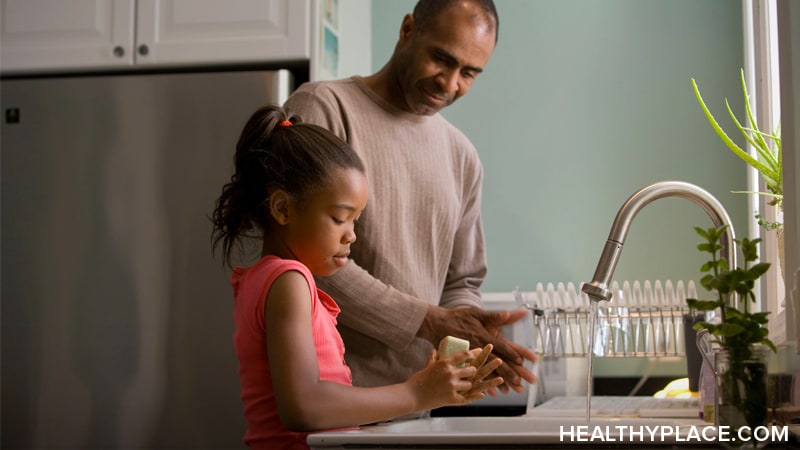Is It Normal to Feel Anxious as COVID-19 Rules Change?

In still-limited ways, society is finally beginning to reopen and emerge from the restrictions of the COVID-19 pandemic, which, surprisingly, is a source of increased anxiety for many people. Shouldn't we all be relieved and happy? Is it normal to feel continued or even heightened anxiety? It is indeed normal to have a host of mixed feelings, including anxiety, as COVID-19 rules change. Here's why, plus five tips to deal with it.
Adjustment Anxiety Is a Real Thing
Change and uncertainty are big causes of anxiety, and any adjustment is full of both change and uncertainty. Sometimes, difficulty getting used to change becomes highly disruptive to daily life, and when that happens, people may experience an adjustment disorder. Adjustment disorders are temporary and happen in response to an identifiable stressor, such as a move, career change, life transition, or a situation such as the COVID-19 pandemic. While this might seem baffling, even positive changes--because they are indeed changes--can lead to either an adjustment disorder or feelings of stress and anxiety that fall short of this diagnosis. This means that even if you are happy that pandemic-related restrictions are lifting, you might legitimately be feeling anxiety.
On the other hand, you might be experiencing anxiety because you don't feel that it's safe to re-open. Further, there is much controversy and conflict around vaccines. Is the supply enough? When will everyone be able to be vaccinated? Are the vaccines even safe? Are they more dangerous than the virus itself? Are they effective? If so, why do we need masks? Maybe masks are good long-term. Maybe they're more dangerous to our health than the virus.
While it's not my place, purpose, or level of expertise to try to offer answers or even share my opinion, I can offer assurance that, given the mere fact that we're experiencing more change and that there is continued (and loud) controversy, it is normal and okay to feel anxious as COVID-19 rules change. If you do feel anxious, you don't have to feel helpless. Here are some tips for dealing with anxiety caused by pandemic-related changes.
5 Tips to Deal with Anxiety Caused by COVID-19 Rule Changes
Anxiety is normal, but it doesn't have to control your life. Use one or more of these five tips to reduce your anxiety about this adjustment period.
- Operate within your personal sphere of influence one moment at a time. Many rules and regulations, as well as the novel coronavirus itself, are beyond our control. There's a lot more, though, in our lives that is under our individual domain. Shift your focus onto what you can control in each little moment of your day. Ask yourself, "What can I do in this moment to feel centered? What is one positive thing I can pay attention to right now?" Making this a habit shifts your thoughts and emotions and empowers you to take actions you can and want to take.
- Be selectively informed. If you pause to listen to what social and large, mainstream media sources say, you will hear extremes on both ends of the political spectrum. Reflect on these extremes for a moment, and evaluate to what degree either side is absolutely true in your own daily life. Yes, there are issues we all face. But chances are, in your own life, the extremes that each side is screaming don't really apply. It's important to know what is going on, but you can choose to be selective in where you receive your information. Try to find a regional or local news source that is relatively neutral, and use that as your source of information. Check this source no more than twice daily to learn what you need to know. Otherwise, keep your attention on what's happening in your own life moment by moment.
- Honor yourself and your own unique needs. With information gleaned from your selective source, make decisions that are right for you and your own life situation. Other people's opinions on whether or not you should be vaccinated or begin to be more active in the world are just that--opinions that are uninformed. Know and honor yourself, and remind yourself that opinions are irrelevant to you.
- Evaluate what you want to change or keep. This time of transition is a great opportunity for reflection. What new routines in this past year brought positive changes for you and your loved ones? What are you ready to discard? What is most important to you and your family, and what purposeful routines and actions do you want to keep or form to live with meaning and purpose? Having regular family check-ins to discuss your routines and evaluate what is and is not working can reduce anxiety and help life run smoothly and purposefully.
- Celebrate every little positive change. Actively celebrating things, even in small ways like lighting a candle or dancing to a favorite song, positively impacts the brain and directly affects thoughts and emotions. Celebrations activate the brain's reward center and flood the body with feel-good chemicals that replace stress-related chemicals. This means that your celebrations just might override your normal anxiety-response to change, especially when done consistently over time.
We are still in the long, dark pandemic tunnel, but there's a bright light at the end of it that is now visible. Allow yourself to feel what you feel, and know that anxiety is a natural reaction. Accept your feelings so you can then turn your attention to actively moving past anxiety so that it no longer controls you.
APA Reference
Peterson, T.
(2021, April 22). Is It Normal to Feel Anxious as COVID-19 Rules Change?, HealthyPlace. Retrieved
on 2025, December 2 from https://www.healthyplace.com/blogs/anxiety-schmanxiety/2021/4/is-it-normal-to-feel-anxious-as-covid-19-rules-change